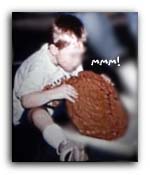![[ PACING THE VOID ]](http://wc.arizona.edu/images/void_button.gif)






|

 Psst! Want a cookie?
Psst! Want a cookie?
 No, we haven't figured out how to set up a snack-food server - (ed:Yet.) I'm talking about a Magic Cookie, the browser feature which seems to be getting an incredible amount
of press lately.
No, we haven't figured out how to set up a snack-food server - (ed:Yet.) I'm talking about a Magic Cookie, the browser feature which seems to be getting an incredible amount
of press lately.

 So, what is a Magic Cookie?
So, what is a Magic Cookie?
 A Magic Cookie, or just plain cookie, is something a server gives your browser when you hit a website that is deigned to hand them out. Your browser holds onto this cookie until a specified date, and should you return to the server before then, your browser will hand over a copy of the cookie it's been storing in the meantime.
A Magic Cookie, or just plain cookie, is something a server gives your browser when you hit a website that is deigned to hand them out. Your browser holds onto this cookie until a specified date, and should you return to the server before then, your browser will hand over a copy of the cookie it's been storing in the meantime.
 It's like getting your hand stamped by a bouncer at a bar, except with a Magic Cookie the ink stays on you until next year and it's a custom stamp.
It's like getting your hand stamped by a bouncer at a bar, except with a Magic Cookie the ink stays on you until next year and it's a custom stamp.
 Who does this benefit? The people who run the website, mostly, because it makes it easy to figure out who the site's repeat customers are. Cookies also mean an easier way of 'subscribing' people to a members-only homepage, for example, because someone can establish their account and then return without a password because the server will recognize them by their cookie.
Who does this benefit? The people who run the website, mostly, because it makes it easy to figure out who the site's repeat customers are. Cookies also mean an easier way of 'subscribing' people to a members-only homepage, for example, because someone can establish their account and then return without a password because the server will recognize them by their cookie.
 Cookies are usually run a line or so in length, but they can store up to 4000 bytes worth of information, which is about four pages of text. Cookies are composed of all kinds of information but most of it is only good to the computer that gave you the cookie in the first place.
Cookies are usually run a line or so in length, but they can store up to 4000 bytes worth of information, which is about four pages of text. Cookies are composed of all kinds of information but most of it is only good to the computer that gave you the cookie in the first place.
 If you're using Netscape, you can peek at your cookies by going into your Netscape directory and opening the 'cookies.txt' file. If you're on a Macintosh, same thing, but you're looking for the 'Magic Cookies' document. I can tell you right now, it's probably going to be a boring read, because most cookies look like something your cat would type out if he slept on the keyboard. One of my cookies, for example, looks like this.
If you're using Netscape, you can peek at your cookies by going into your Netscape directory and opening the 'cookies.txt' file. If you're on a Macintosh, same thing, but you're looking for the 'Magic Cookies' document. I can tell you right now, it's probably going to be a boring read, because most cookies look like something your cat would type out if he slept on the keyboard. One of my cookies, for example, looks like this.
.infoseek.com TRUE / FALSE 881367103
InfoseekUserId
3C4355DA4EB98A3352B34929FB4&7A97
 You can tell that I picked that one up from Infoseek, but that's about all, because the rest of the information was cooked up by the Infoseek machines to encode something along the lines of the time and date I visited. That's what the long string of gibberish probably is - just a way of saying "Bryan Hance stopped by on 4th, at 5:02 p.m." If it's really good, it'll also include something like "He was looking for information on 'Chinese food' and uses an IBM computer." Then again, it could simply say "This computer has been to Infoseek." It just depends on how Infoseek came up with that string.
You can tell that I picked that one up from Infoseek, but that's about all, because the rest of the information was cooked up by the Infoseek machines to encode something along the lines of the time and date I visited. That's what the long string of gibberish probably is - just a way of saying "Bryan Hance stopped by on 4th, at 5:02 p.m." If it's really good, it'll also include something like "He was looking for information on 'Chinese food' and uses an IBM computer." Then again, it could simply say "This computer has been to Infoseek." It just depends on how Infoseek came up with that string.

 Read any of today's publications though, (even the local
ones) and it sounds like cookies are the work of Satan. For some reason many people have been led to believe they read something like:
Read any of today's publications though, (even the local
ones) and it sounds like cookies are the work of Satan. For some reason many people have been led to believe they read something like:
User Name:
Computer Type:
Phone #:
Passwords:
Credit Limit:
Last time they actually had a date:
What they do when nobody's looking:
Mother's maiden name:
Deepest Darkest Secret:
 Which, obviously, is not true. Just because cookies store a unique bundle of information on the hard drive, people have made them out to be some kind of threat, or a way of prying information out of the user.
Which, obviously, is not true. Just because cookies store a unique bundle of information on the hard drive, people have made them out to be some kind of threat, or a way of prying information out of the user.
 Personally, I think it's absurd for people to call cookies an invasion of their privacy when half of those very same people have homepages, accesable to the entire planet, that explain their lives to the world in vivid detail - even the stuff you didn't
want to know about.
Personally, I think it's absurd for people to call cookies an invasion of their privacy when half of those very same people have homepages, accesable to the entire planet, that explain their lives to the world in vivid detail - even the stuff you didn't
want to know about.
 On the other hand, with the amount of commercial sites popping up on the 'net lately, many of which are running some sort of audience identification/marketing schemes, I can see why it would
be nice to have a cookie-unfriendly browser. There are filtering sites through which you can keep yourself from the prying eyes of the site you're viewing, and several people have come up with programs to gobble up
your cookies faster than a sugar-buzzed two-year-old. (One of them seems to be having legal trouble with the Children's Television Workshop over the name of his software, though.)
On the other hand, with the amount of commercial sites popping up on the 'net lately, many of which are running some sort of audience identification/marketing schemes, I can see why it would
be nice to have a cookie-unfriendly browser. There are filtering sites through which you can keep yourself from the prying eyes of the site you're viewing, and several people have come up with programs to gobble up
your cookies faster than a sugar-buzzed two-year-old. (One of them seems to be having legal trouble with the Children's Television Workshop over the name of his software, though.)
 There are also some great web sites that can explain cookies for the layman. This is exactly what the world needs, because Netscape's cookie pages read about as easily as calculus.
There are also some great web sites that can explain cookies for the layman. This is exactly what the world needs, because Netscape's cookie pages read about as easily as calculus.

 Oddly enough, even though Netscape developed the Magic Cookie, they say there was "no compelling reason" behind the name. Yeah, right. I've always imagined a stressed-out cadre of
programmers bingeing on those Special Baked Goods late one night, if you catch my drift, and then coming up with the idea between hysterical fits of laughter and teary eyes. Netscape has yet to return my email regarding this, but I doubt if they will.
Oddly enough, even though Netscape developed the Magic Cookie, they say there was "no compelling reason" behind the name. Yeah, right. I've always imagined a stressed-out cadre of
programmers bingeing on those Special Baked Goods late one night, if you catch my drift, and then coming up with the idea between hysterical fits of laughter and teary eyes. Netscape has yet to return my email regarding this, but I doubt if they will.

 In the meantime, go ahead peek at your cookies. Just don't get too excited about them. Cookies, while a fun subject and a neat developer's tool, are not the evil device everyone thinks they are. Unless a possible new cookie standard includes some scary tricks that nobody has discovered yet, Magic Cookies are just about as threatening as the real thing.
In the meantime, go ahead peek at your cookies. Just don't get too excited about them. Cookies, while a fun subject and a neat developer's tool, are not the evil device everyone thinks they are. Unless a possible new cookie standard includes some scary tricks that nobody has discovered yet, Magic Cookies are just about as threatening as the real thing.

PAST PACINGS:
#1- January 24
#2- January 31
#3- February 4
#4- February 7
#5- February 11
#6- February 14
#7- February 18
|
![[ PACING THE VOID ]](http://wc.arizona.edu/images/void_button.gif)






